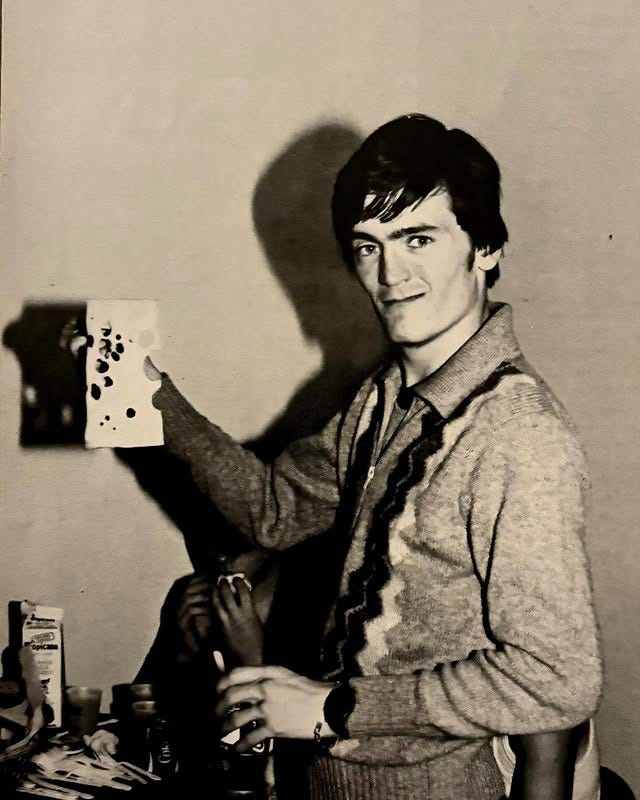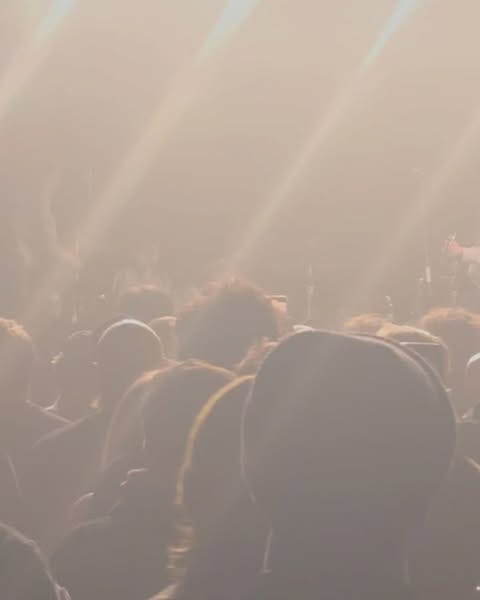Fluxblog 502: a 20th century Christmas
Plus 8 of my favorite songs from the year, including music by Chappell Roan, Fievel Is Glauque, Sabrina Carpenter, Boeckner, and Cheekface
This week’s playlist is A 20th CENTURY CHRISTMAS, which will be my holiday playlist for this year. It’s a stylistically eclectic mix of holiday music from the 1930s through the mid 1990s, and it’s designed to be something you can put on for three hours in the background while you have company over. There’s a lot of big obvious classics, some interesting variations on standards, and a few songs that go back to a pre-World War II version of Christmas. I’ve been thinking a lot about how Christmas as we know it today is really about trying to recreate or reconnect with the version of it from the post-War era; a celebration of American prosperity and commercialism in the mid-20th century. In a lot of ways, this playlist is a tribute to that idealized version of the holiday season.
[Spotify | Apple Music | YouTube]
I didn’t have any time to write new posts this week, but here’s a few posts about some of my favorite songs from 2024 that I’ve published through the year.
Our Sin’s The Lovin’ Kind
Jessica Pratt “Get Your Head Out”
Here in the Pitch is one of the best sounding new records I’ve encountered from the past few years. It’s like the audio equivalent of very beautiful black and white photography printed on matte paper so the blacks are especially deep and the grey tones are rich and nuanced. It’s an album where the tonal palette is so carefully selected and the reverb is so precisely calibrated that elements as ordinary as the human voice, an acoustic guitar, or a vintage organ get nudged into painterly abstraction without losing form and function. There’s a poetry to this sound Jessica Pratt and Al Carson have devised that’s very intuitive and in some ways nostalgic but difficult to put into words without resorting to purple prose.
“Get Your Head Out” captivates me in large part because it’s an evocative sensory experience that’s just outside my capacity to describe it. A lot about it feels familiar, but just as much about the recording is either uncanny or triggers a deja-vu effect. Pratt’s composition and vocal performance is clearly rooted in mid-20th century easy listening and I’m pretty sure she and Carson were deliberately aiming for the odd cosmic tonality of mid-century reverb. But despite this old timey quality, the song doesn’t register as a retro pastiche to me. It’s more like reaching back to the music of the past to create an overwhelming romantic atmosphere beyond the boundaries of contemporary fashion, and that’s just as much in the sound of the recording as it is in Pratt’s gorgeous and low-key jazzy vocal melody.
The most mesmerizing element of “Get Your Head Out” is Carson’s organ and mellotron parts, which sound misty or like light reflecting on rippling water at night. Those parts are fairly quiet in the mix, implying a weightlessness relative to Pratt’s voice and guitar. But even those central elements don’t take up too much space in the mix, and the whole song feels light enough to carry on a breeze.
Buy it from Bandcamp.
Standing Face To Face With “I Told You So”
Chappell Roan “Good Luck, Babe!”
Chappell Roan’s primary songwriting partner is Dan Nigro, who’s best known for his work as Olivia Rodrigo’s primary songwriting partner. Roan and Rodrigo have different enough vibes that it wasn’t obvious to me that they had this in common, but knowing they share a collaborator makes their musical similarities come into sharp focus. The main thing I’ve noticed about Rodrigo is that it’s as though all her songs were written with the specific goal of becoming karaoke classics, and covering a range of what makes a great karaoke for different types of singers. Nigro’s work with Roan is on a similar wavelength, but I think the goal is more about creating songs that will crush in live performance. The best tracks on The Rise and Fall of a Midwest Princess contain a lot of audience participation moments, and they’re typically the most fun parts of the song even if it can verge on sounding like a horny version of Kidz Bop. But in either case, Nigro is crafting very dynamic and theatrical pop rock music that pulls you in and makes you want to become a part of it whether you’re screaming along at a show, singing it at a karaoke bar, or belting it out in the shower.
“Good Luck, Babe!” is more of a shower song. If “Red Wine Supernova,” “Femininomenon,” and “Hot to Go” are transparently oriented towards the stage, this one feels more like it’s aimed at the radio. It’s easy to enjoy at face value – the melodies are strong and the groove is pleasant and Roan’s voice soars without getting distractingly bombastic or shrill. Roan can get silly in her songs but she never undermines or undersells a big feeling, and her vocal range is impressive enough that over the course of “Good Luck, Babe!” she’s pulling from the classic bag of power ballad tricks as well as more understated Kate Bush moves in her higher register. The emotional core of the song is potent and volatile, with lyrics that describe a fraught romantic sidepiece situation with enough specificity to be intriguing but relatable enough that it could totally wreck you if you happened to hear it in passing at a Walgreens in a fragile state. The verses tick-tick-tick, but once she’s crying out “I just want to love someone who calls me baby,” the feelings bomb goes ka-boom.
Buy it from Amazon.
A Machine That Only Brings You Sorrow
Boeckner “Lose”
One of the oldest conventions of this blog is using a line from a song as the title of the post, ideally something abstract and evocative. Sometimes I don’t have a lot to work with, but in the case of “Lose,” it’s like top to bottom cool abstract evocative lines. “Living blind in isolation,” “every star in retrograde,” “this is a city of doorways,” “the vanishing neighbors,” “some Eldritch strange eraser,” and that’s just the first verse. Dan Boeckner built the song to feel like a speeding car, the lyrics feel a little like quick glimpses out the window as you zoom away from somewhere, not necessarily towards someplace in particular. It’s hard to shake how doomed this song feels – everything is crumbling around him, he was bound to lose his love – but Boeckner sings with so much heart and go-for-broke intensity that it overpowers any of his cynical impulses.
Buy it from Sub Pop.
We’re All Barely Real
Fievel Is Glauque “As Above So Below”
The first time I wrote about Fievel Is Glauque a couple years ago I described them as an “intriguing common ground between Gaucho-era Steely Dan, Stereolab, and Tom Jobim,” and that’s even more true now that they’ve graduated to more hi-fi production and more elaborate arrangements. But they also sound nothing like those artists in that there’s almost always some twitchy, chaotic element to their songs that (to varying degrees) undermines their smoothness and sophistication. “As Above, So Below” is essentially a sunny ballad that sounds like it’s from some lost mid-20th century musical but the arrangement is deliberately a little too busy, giving the music a nervous energy you wouldn’t find in actual music of the era. I can see how this would be off-putting to some people, but I find this very intellectually engaging and aesthetically appealing. I feel like the oddness accentuates the loveliness, like how salt brings dimension to the taste of caramel or chocolate.
Ma Clément’s lyrics are intriguing, if a little hard to discern. In this song she’s singing about some very big ideas – the notion of heaven and souls, magical vs natural, science and faith, the possibility that any of us can truly change the world – but with a bit of an arched eyebrow. Not in a dismissive way, but more in a way that signals humility and good humor about very heavy concepts.
Buy it from Bandcamp.
I Brand-New’d It For Ya
Sabrina Carpenter “Espresso”
The first few times I heard “Espresso” I was trying to figure out why it felt so familiar and then it hit me: this song is remarkably similar to late-period Phoenix, right on down to the melody in the chorus sounding extremely Thomas Mars to me. I’m not sure if this is something anyone involved was shooting for but it’s a great aesthetic. Sunny and fresh and clean and overtly relaxed, but tightly wound in more subtle ways. Sabrina Carpenter isn’t a very distinct vocalist but she has a big personality that comes through in her lyrics – funny and flirty and a little camp, as though she’s trying to bring a Kim Cattrall energy to pop. “Espresso” is basically a song about being impressed by one’s own skill in attracting men, with her telling us up top “I can’t relate to desperation” because so many guys get obsessed with her that it’s mostly become amusing to her. The light and breezy feel of the song is key in making this sentiment work. It’s just not that serious, so it doesn’t come off as either annoyingly arrogant or like she’s trying to prove something to the listener. It’s mostly just “ooh, isn’t this fun?,” and so it is.
Buy it from Amazon.
A Virtual Connection
The Marías “No One Noticed”
“No One Noticed” is a song about contemporary long-distance romance, but one where the lyrical emphasis is placed almost entirely on feeling lonely and desperate for intimacy. There’s a lot of love and affection in María Zardoya’s vocals and in the delicate and dreamy quality of the arrangement, but the emotional undertow of the song is in the awareness that this “virtual connection” is just a temporary solution for her real problem. The music builds up the romance but undercuts it the second half as she considers what would happen if she were to fly to their city: “Hold me, console me, and then I leave without a trace.” That last part cuts deep – not just for confronting the futility head-on, but also in how it sounds like she’s talking herself out of something she needs.
Buy it from Amazon.
We Made This Thing A Mess
Crumb “Side by Side”
The lyrics of “Side by Side” are sung from the perspective of someone who’s changed their life to suit someone else regardless of its negative impact on them. It’s very clear and direct, but the music complicates the sentiment by making the song very emotionally ambiguous. I think a lot of the point here is that we’re listening to a person who hasn’t decided how they feel about the situation they’re in, and any simmering resentment in the lyrics is clouded by their affection for the person they’re addressing and maybe a little bit of self-loathing and guilt. Lila Ramani’s vocal performance mostly conveys ambivalence, but you can hear stronger feelings rise up to the surface through the song. The arrangement and structure is pure Crumb – hazy and zoned out but very brisk and dynamic, all building towards a musical refrain that provides a catharsis that doesn’t contradict the indecisive feeling of the song.
Buy it from Bandcamp.
Looking For Others Wearing Really Big Shirts
Cheekface “The Fringe”
Cheekface is a godsend for anyone out there who misses Cake, or ever wished Calvin Johnson had made a late 70s/early 80s style power-pop record, or wanted to know what a hybrid of They Might Be Giants and Talking Heads might be like. But despite aesthetic similarities to some very specific artists of previous generations, Cheekface has their own personality. A lot of that comes down to the way they mix and match the recognizable elements, like they simply found a new way to style that droll Johnson/John McCrea vocal affect into a fresh new outfit. The personality also comes through in Greg Katz’s lyrical fixation on recognizable hipster archetypes as they manifest in the present day – a frustrated guy deciding to make himself a local character in a town full of surveillance cameras, guys who are frustrated that their friends “getting square,” dudes who are “dispassionately vaping” while watering plants, and in the case of “The Fringe,” an artist who seems to be motivated to create unappealing art to gain some clout. The jokes are pretty good, but the replay value is a direct result of the band taking structure and arrangement very seriously.
Buy it from Bandcamp.
LIVE LIVE LIVE LIVE
I saw Geese, Death’s Dynamic Shroud, and Lip Critic at the Music Hall of Williamsburg last night. All three really great and dynamic shows – I recommend clicking through to see Geese play a strong and faithful cover of Television’s “Marquee Moon,” and to witness Lip Critic, who really have the juice on stage. They’re real firestarters, true punkin’ instigators.
I also saw Interpol this week, and finally got to see them play “No I in Threesome,” one of my top favorites in their catalog.
And I saw TV on the Radio, who I think actually leveled up as a live act after basically being gone for a decade.
LINK LINK LINK LINK
• Simon Vozick-Levinson of Rolling Stone wrote a lovely tribute to Will Cullen Hart of The Olivia Tremor Control, who passed away last week.











